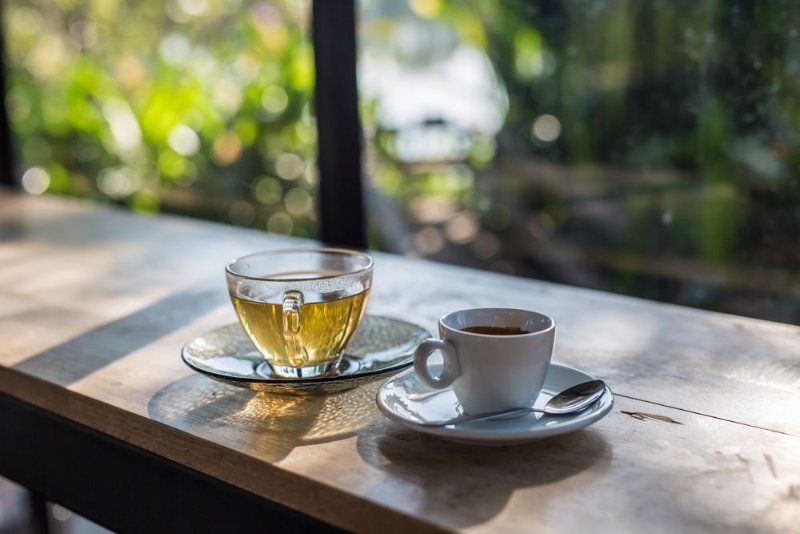The debate between coffee and tea has brewed for centuries, with each beverage offering its own unique history, cultural significance, and health benefits.
This article delves into the rich tapestry of coffee vs tea, exploring their origins, historical rivalry, and modern-day relevance for you to settle this dispute for yourself and find your favorite beverage between the two.
Coffee vs Tea: A Historical and Cultural Comparison
Both coffee and tea have profoundly shaped societies worldwide. Ever since the inception of tea in China and the rise of coffee in Africa, these beverages have played diverse roles in cultural and social life in various aspects.
They have influenced trade routes, sparked revolutions, and become integral parts of daily routines across the globe then evolved to become symbols of culture in their own right.
What Came First: Tea or Coffee?
When considering what came first, tea or coffee, historical evidence points to tea.
The Origins of Tea
Tea's history stretches back much further than coffee's. Legend places its discovery in China around 2737 BC by Emperor Shen Nung.
From its origins as a medicinal brew, tea gradually evolved into a beloved beverage, spreading throughout Asia and eventually reaching the West, beginning with Britain.
The Origins of Coffee
On the other hand, the origins of coffee are traced to Ethiopia, with legends of a goatherd noticing his goats' energetic behavior after consuming coffee berries.
Coffee's spread began in the 15th century, moving through the Middle East and then into Europe, where coffeehouses became hubs of social and intellectual activity.

Alternatives to Coffee and Tea Throughout History
Before coffee and tea became widely accessible, various alternative beverages have been in their shoes as the primary source of caffeine.
Caffeine Sources Before Coffee
People consumed caffeine from sources like tea, which predates widespread coffee use, guarana, and kola nuts. These caffeine sources provided stimulating effects, though not as universally as coffee would later become.
Tea vs Coffee: A Historical Rivalry
The tea vs coffee history isn't just about chronology; it has become a bit of a rivalry. Different regions developed strong preferences, leading to distinct cultural associations.
Tea’s Dominance in Asia and Britain
Tea established deep roots in Asian cultures, particularly in China and Japan, where it became intertwined with intricate ceremonies and social customs.
Additionally, its adoption in Britain afterwards, especially during the British Empire, cemented its global influence.
Coffee’s Rise in the Middle East and Europe
After its discovery in Africa, coffee began thriving in the Middle East and becoming a staple in social gatherings and religious practices. Its arrival in Europe sparked the rise of coffeehouses, which became centers of intellectual and political discussion.

Different pre-coffee drinks and coffee substitutes
Coffee vs Other Drinks: A Comparative Look
Aside from plain tea, coffee has been compared to various other beverages as well as other variations of tea like matcha.
On top of that, modern alternatives like energy drinks offer different caffeine delivery methods and flavor profiles, giving people more options to choose from.
Coffee and Tea’s Role in Modern Caffeine Consumption
Today, both coffee and tea play significant roles in modern caffeine consumption. Coffee is favored for its strong, immediate effect, while tea offers a gentler, more sustained energy boost. Either way, these two have rose to the occasion and become go-to choices to start the morning for many.
Considering coffee vs tea in terms of caffeine content, coffee generally contains more, but variations exist depending on brewing methods and tea types, so people can customize their favorite cups of tea or coffee based on personal preferences. Both beverages continue to hold cultural significance, shaping social interactions and daily routines worldwide.

Both tea and coffee are important components of contemporary caffeine intake
Both coffee and tea offer distinct characteristics and benefits. The choice between these two drinks depends on personal preferences, caffeine needs, and cultural factors. Whether you prefer the bold flavor of coffee or the delicate nuances of tea, it is important to consume them in moderation to fully appreciate their values without going over the daily intake limit of caffeine.
If you're a coffee lover and want to explore authentic coffee flavors, especially Vietnamese coffee, visit our website. 88 Coffee Company brings the most authentic Vietnamese coffee experiences to the United States.
They are committed to providing high-quality coffee, without blends or artificial flavors, at reasonable prices. You can find various products, from roasted coffee beans to traditional phin coffee makers, allowing you to fully enjoy the taste of Vietnamese coffee at home.

